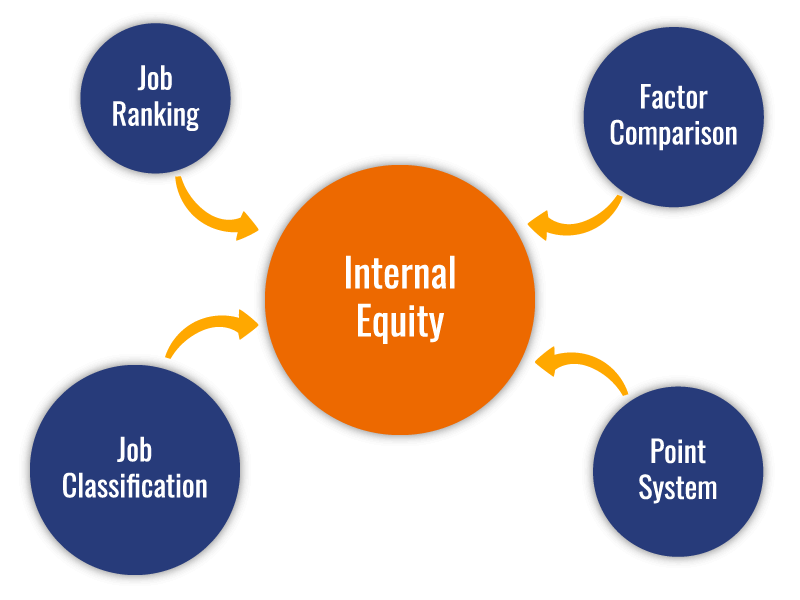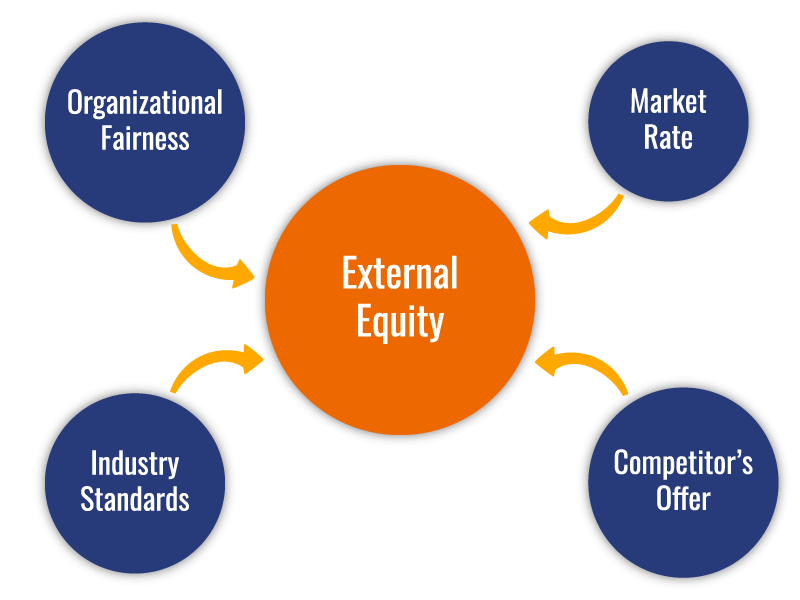The Eternal Debate: Internal Equity Vs. External Equity

Table of Contents
If you have faced an interview, you might have faced the question: What salary do you expect from us? And you might have said with confidence: “Currently, the market is paying ₹xxxx for my experience and position. Therefore, that is the rate I am expecting you to pay me.” But, have you ever wondered how that market rate is decided? Numerous entities come together to form an industry. Each business has numerous departments, each department having many employees. Employees at different levels of the workflow hierarchy have different pay. How does an industry know and pay their employees equal to their value in the market? How are Internal Equities different from External Equity? Which is better: Internal Equity Vs External Equity? This article is the answer to all these questions.
What Is Pay Equity?
Pay equity refers to paying equal remuneration to all the employees in a similar field of work and holding the same position, considering the experience and longevity of their employment with the organization.
A frequently asked question about pay equity is why organizations bother giving equal pay. The answer is simple – to retain talent in their company. If they do not have a payroll standard that is on par with what the other companies provide, the pool of talent will swarm to the other companies. Having an established cloud-based payroll software to calculate the salaries as the organization wishes (and not according to standards) is not a practice that is appreciated much. Therefore, having proper standards for payment is recommended for ease of functioning.

Internal Pay Equity
When you have more than one employee working for you (which is pretty much the case in almost all organizations), there has to be a certain level of impartiality when it comes to paying the employees. Internal Pay Equity refers to comparing the employee’s positions within the organization to ensure that all the employees in the same position are paid fairly.
Your employees have access to the internet, and they converse with the other employees. It is a piece of cake for them to find out whether they are paid as much as their colleagues are. Once they find out that they are paid less than their coworkers in the same position, they tend to feel demotivated and unwilling to work as hard as before. The consequence of unfair pay can be witnessed during the evaluation of an employee’s performance. And it can be noticed that it results in their low performance, causing the downfall of the business’ output on the whole.
A genuine system of payment boosts the morale of the employees and their loyalty. The organization is benefited as its growth is enhanced.

Pros Of Internal Equity: It allows equal pay to all the employees, thereby creating a feeling of equality among the employees.
Cons Of Internal Equity: The main issue with the internal equity pay is that the employees may feel like their job and responsibilities are the same as the others. Therefore, they shall be paid the same as the other employees. Everyone is a victim in their own eyes.

Please select from below options to help us improve our content:
[wpsurveypoll id=”316172450″ style=”flat”]External Pay Equity
External Pay Equity is precisely what the name suggests: pay equality compared to the people in similar positions external to the organizations. This ensures that you have an equal opportunity to hire the best talent. Without external pay equity, all the applicants would go to the organizations paying them a standard rate.
When the organization offers equal pay to their prospective employees, they are more likely to revert this gesture by giving their best to the organization.
However, it should be kept in mind that the standards of payment among the industries may depend on numerous factors besides the employee’s position. These factors include the location of the business, the scale of the business, the level of the jobs, the functions that the employee needs to perform, etc. Due to this reason, the external equity pay can be a little inconsistent.

Pros Of External Equity: This type of pay equity maintains the competitiveness of the organizations to get the best talent in the market.
Cons Of External Equity: The only disadvantage is the expenses incurred to maintain this type of pay equity.
How To Guarantee Internal And External Pay Equity?
There are a lot of debates going on in the market about whether the organization should follow internal equity or external equity. However, it should be understood that before worrying about Internal Equity Vs. External Equity, we should be concerned about No Equity Vs. Equity. Now that we know that offering pay equities can be considered part of the organization’s corporate social responsibility, as they offer fair pay to society and create unbiased standards. Here are four tips that can assist you in ensuring that your organization provides internal and external pay equity:
Stay Updated With The Market Knowledge
For any business to survive, it needs to stay up-to-date with the trends in the market, technology, commodity, and distribution channels. The same goes for pay equity. Besides following the company’s payroll policies, the managers need to be aware of the general market rates for each and every employee. They need to make sure that the salary they provide is neither too high nor too low. This ensures that the organization attracts the best talents available in the market.
Be Smart While Negotiating
Many candidates in the interviews are unaware of the market range and may demand too low or too high an amount. This is not because they do not know how to negotiate salary, but because they are unaware of the market rates of any person with their level of experience in their position. In such cases, it is upon the companies to negotiate their ways around the market rates. If an employee is overpaid, he may think of himself as too high and may not give his hundred percent. On the contrary, the underpaid employees might blame the company later for not paying them according to the market standards even though they were the ones who suggested that rate for their services. They might feel that they are mistreated unfairly. Their employee morale will die, and they might not feel motivated enough to work at their total capacity. They will not think about the debate of Internal Equity Vs External Equity. They are only concerned with their pay being less than the others. Either way, the organization has to bear the loss of productivity.
Consistent Steps Towards Growth
Equity is not limited to just the payment to employees. Raises and opportunities to grow within the organization round up an employment package for any candidate. It is in the hands of the business to offer fair raises to all the employees holding the same position. Besides this, the businesses must keep in mind that this generation of employees looks for growth and opportunities. They must be given equal growing opportunities as any other person in the same position, in the same industry would receive. If not, they will not hesitate to resign to change their organization. To have a higher employee retention rate, it is necessary to offer them equal opportunities to expand their knowledge and skills.
Regulate In Case Of Differences
There may be cases where the employees hired before the new equilibrium pay came into the market are paid according to the older standards. It is most likely that these people would be underpaid. The organizations should stand up to this and modify the salaries of such employees to be according to the current market rate. This action on the employer’s part will create a positive impression of the organization in the mind of the employees. This practice gives your employees a feeling of belongingness, and hence they will contribute more towards the causes of the business.

To Sum It Up
It is essential to have a balance between internal and external equities of pay within an organization. Having either one may enhance the organization’s productivity without a doubt; however, having a balance of both – internal and external equity is what takes the organization to the next level. Organizational success is not Internal Equity Vs External Equity, it is a combination of both. It is an effective and easy way to maintain long-term professional relationships with the employees and retain them.
These pay equities may seem too complicated for the organization to be bothered by. However, if you understand it and follow the tips given above, you will have no issues in creating a payment system that has a pay standard that is fair and equivalent to the market pay. If a company isn’t aware of the pay equities or does not follow them. In that case, it is high time to realize that by implementing them, they are doing a favor to themselves by retaining the talent in the organization.
Grow your business with factoHR today
Focus on the significant decision-making tasks, transfer all your common repetitive HR tasks to factoHR and see the things falling into their place.

© 2026 Copyright factoHR


